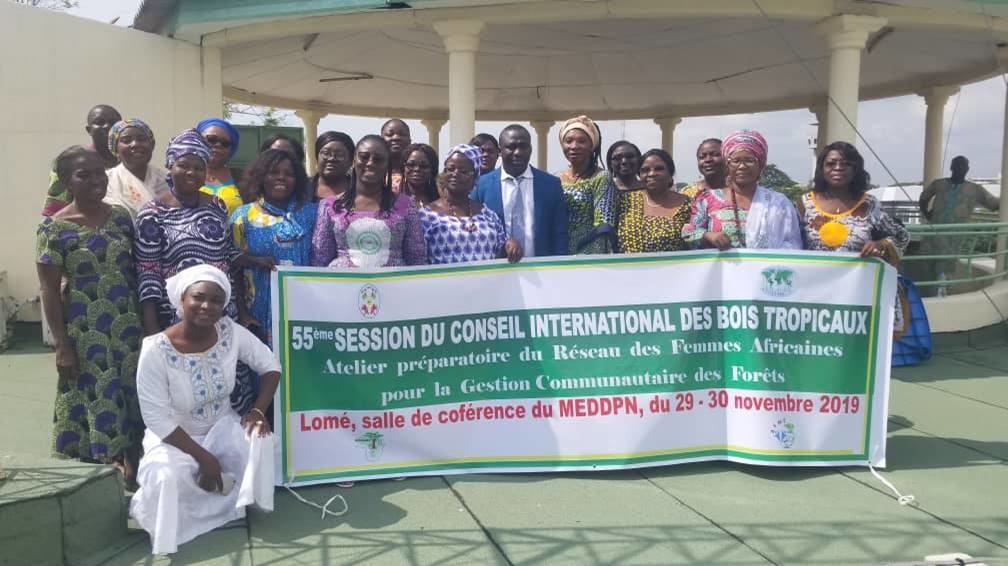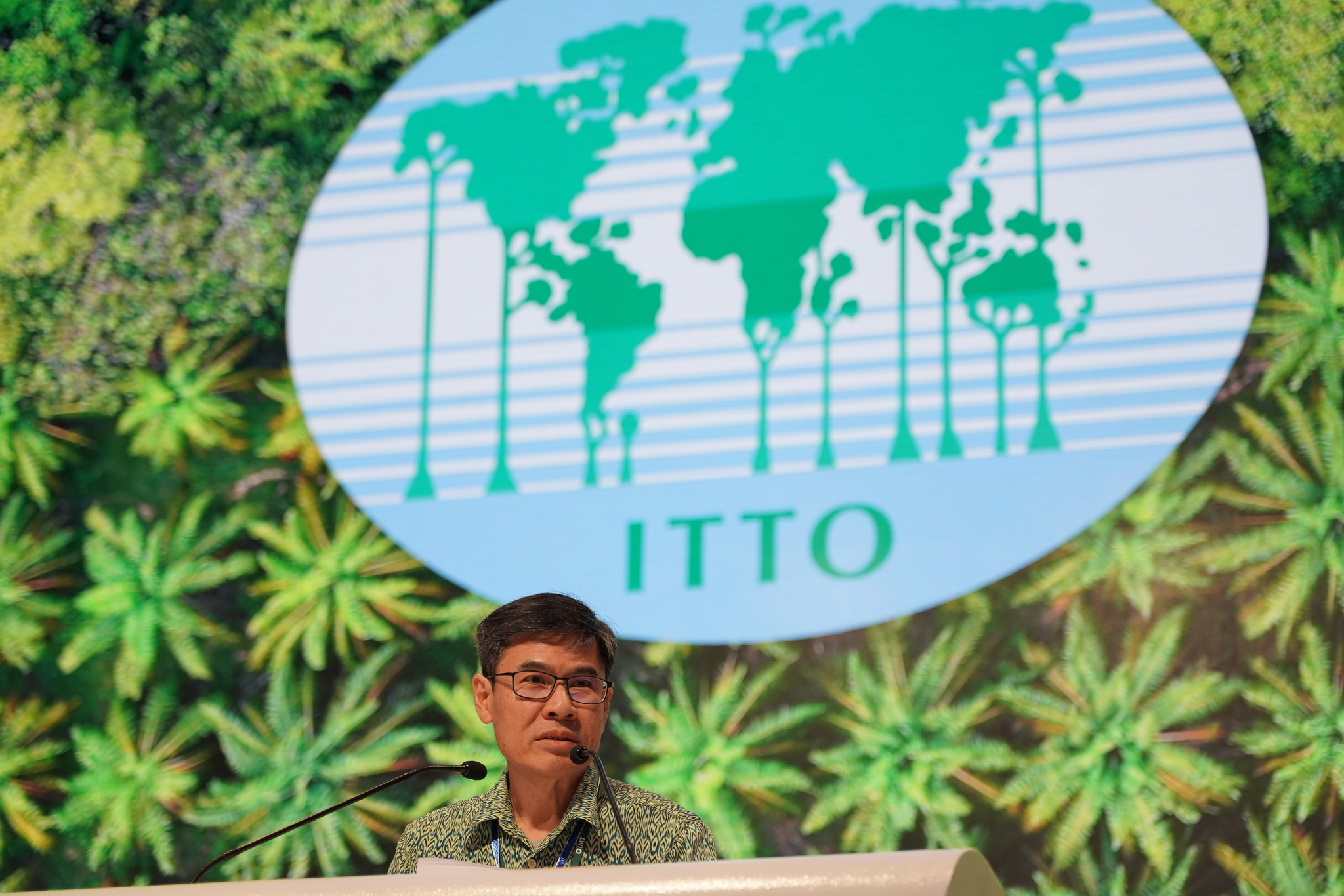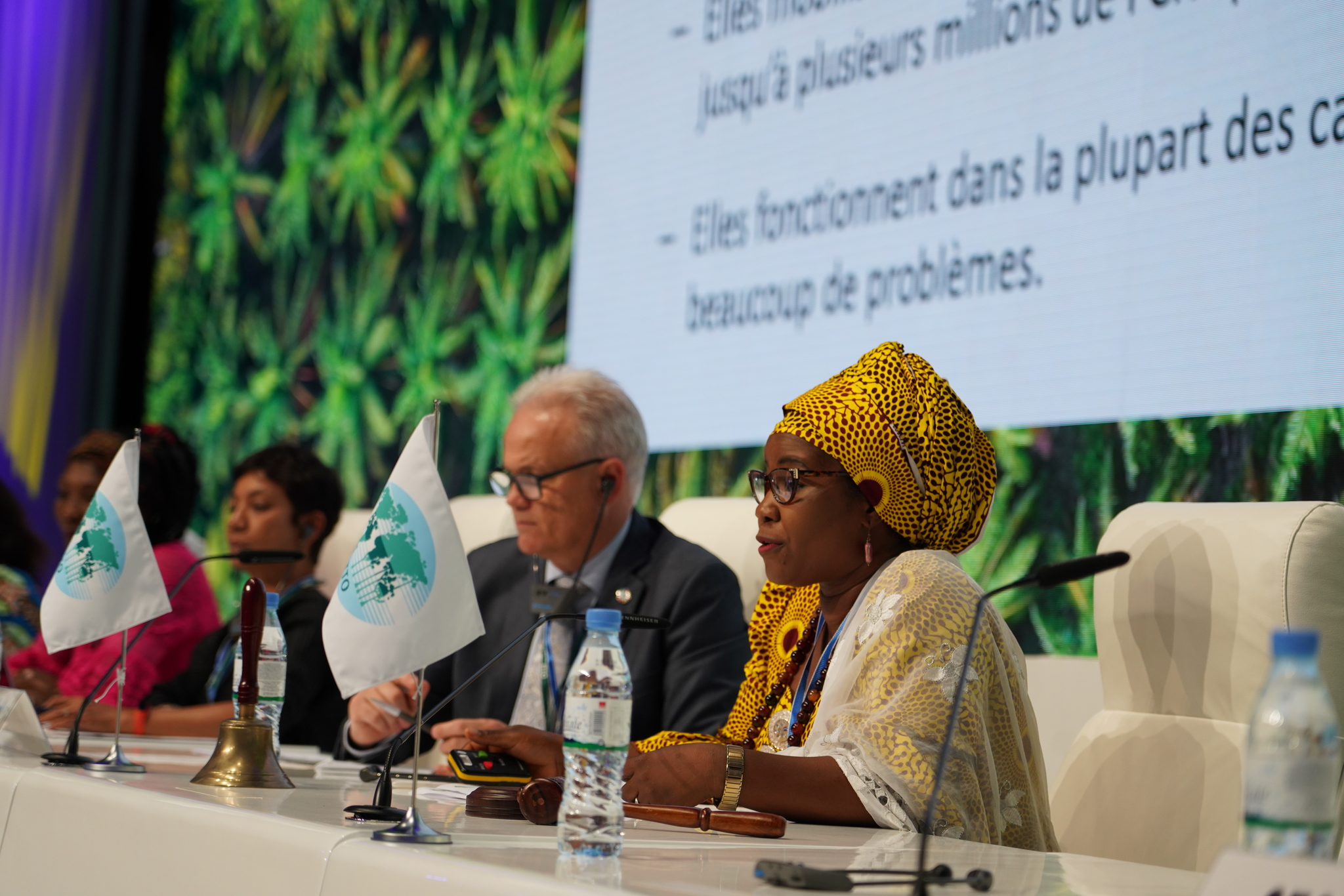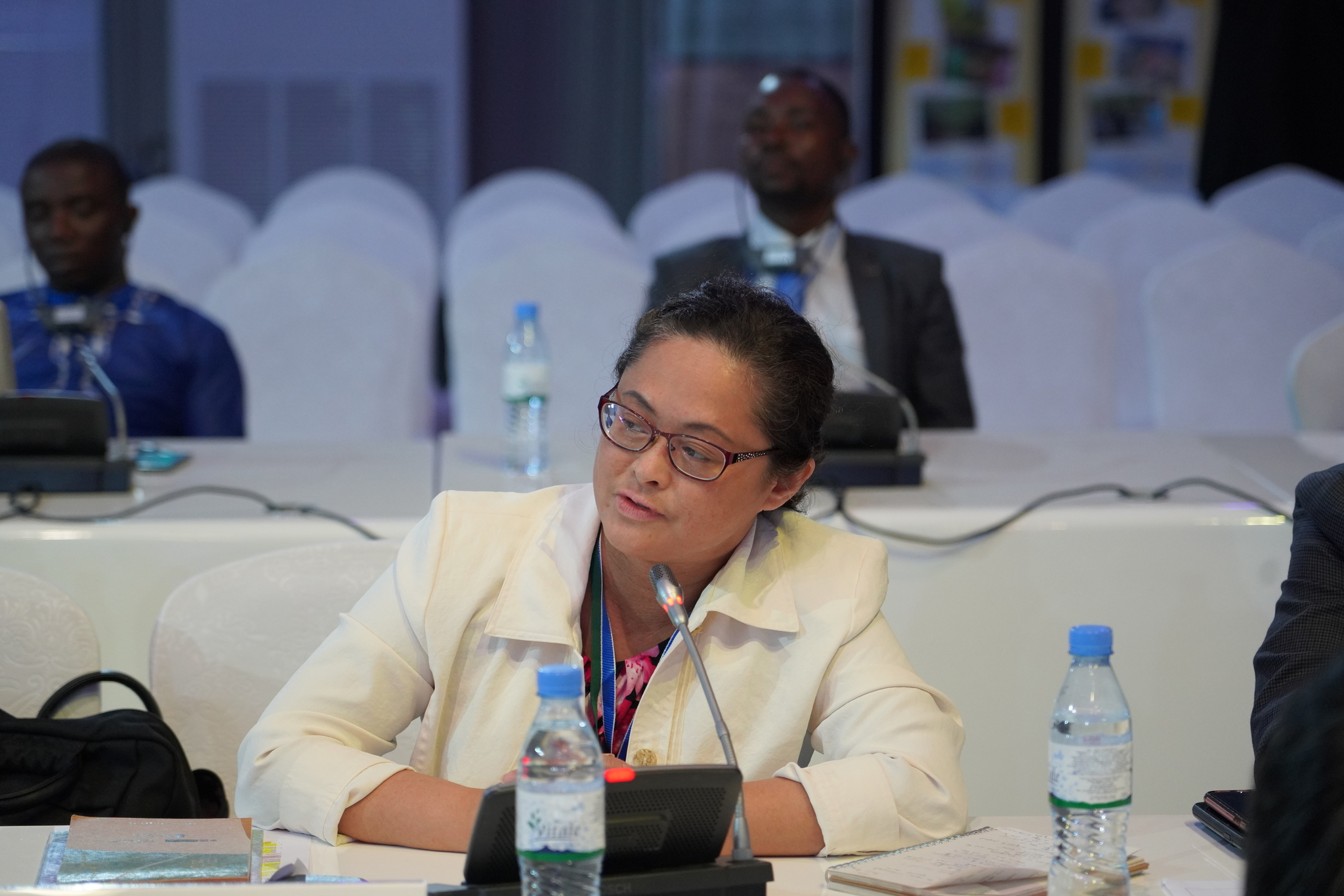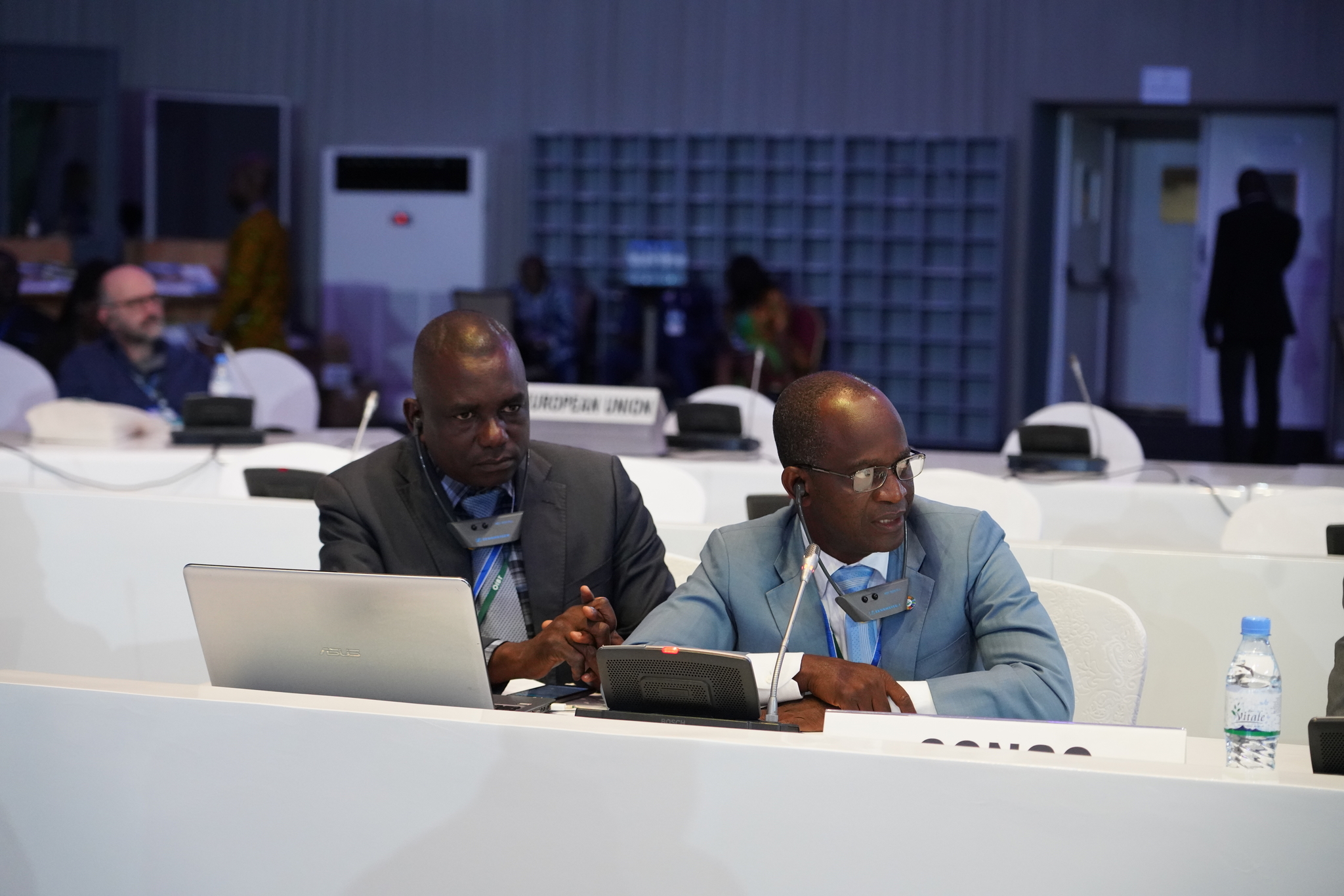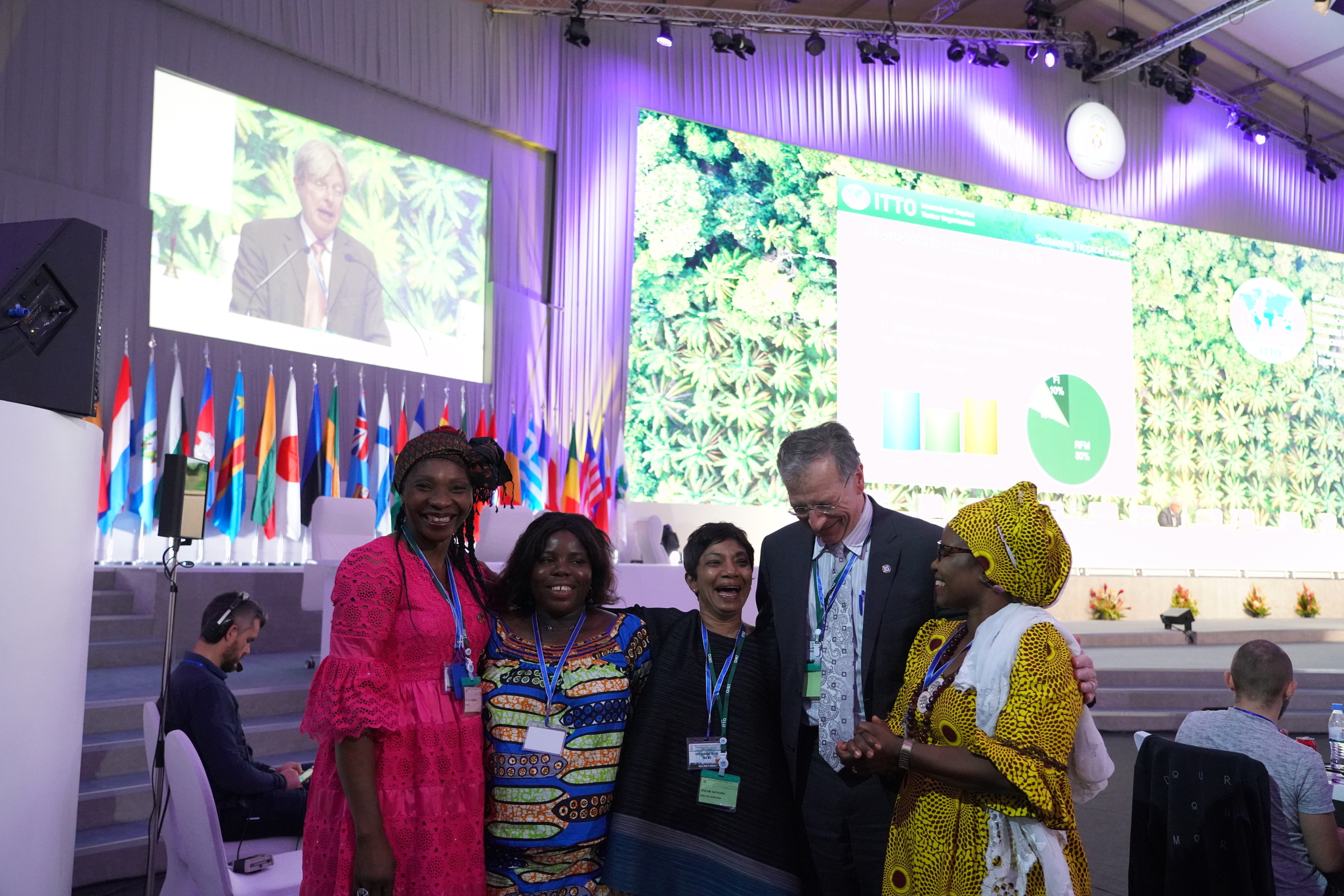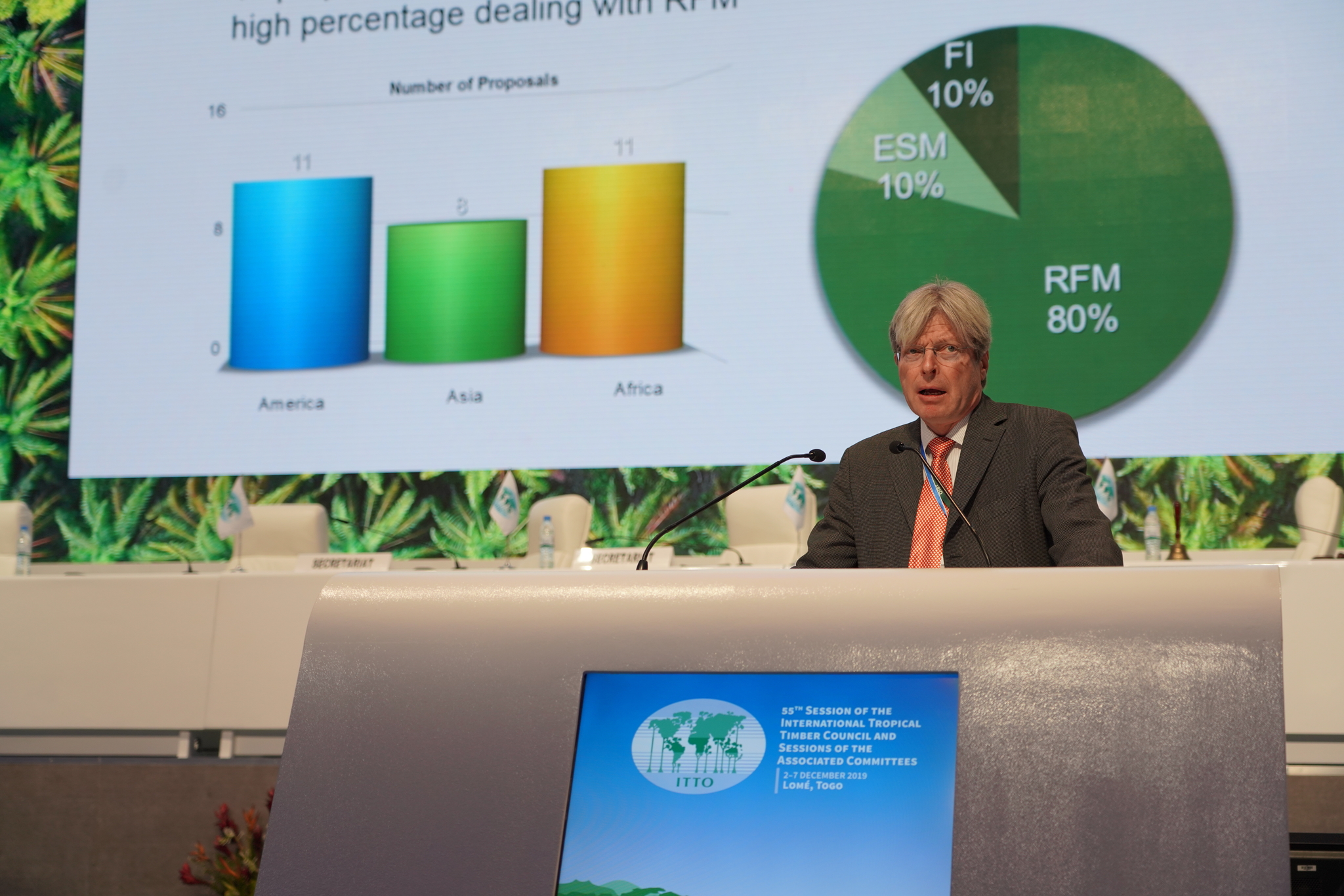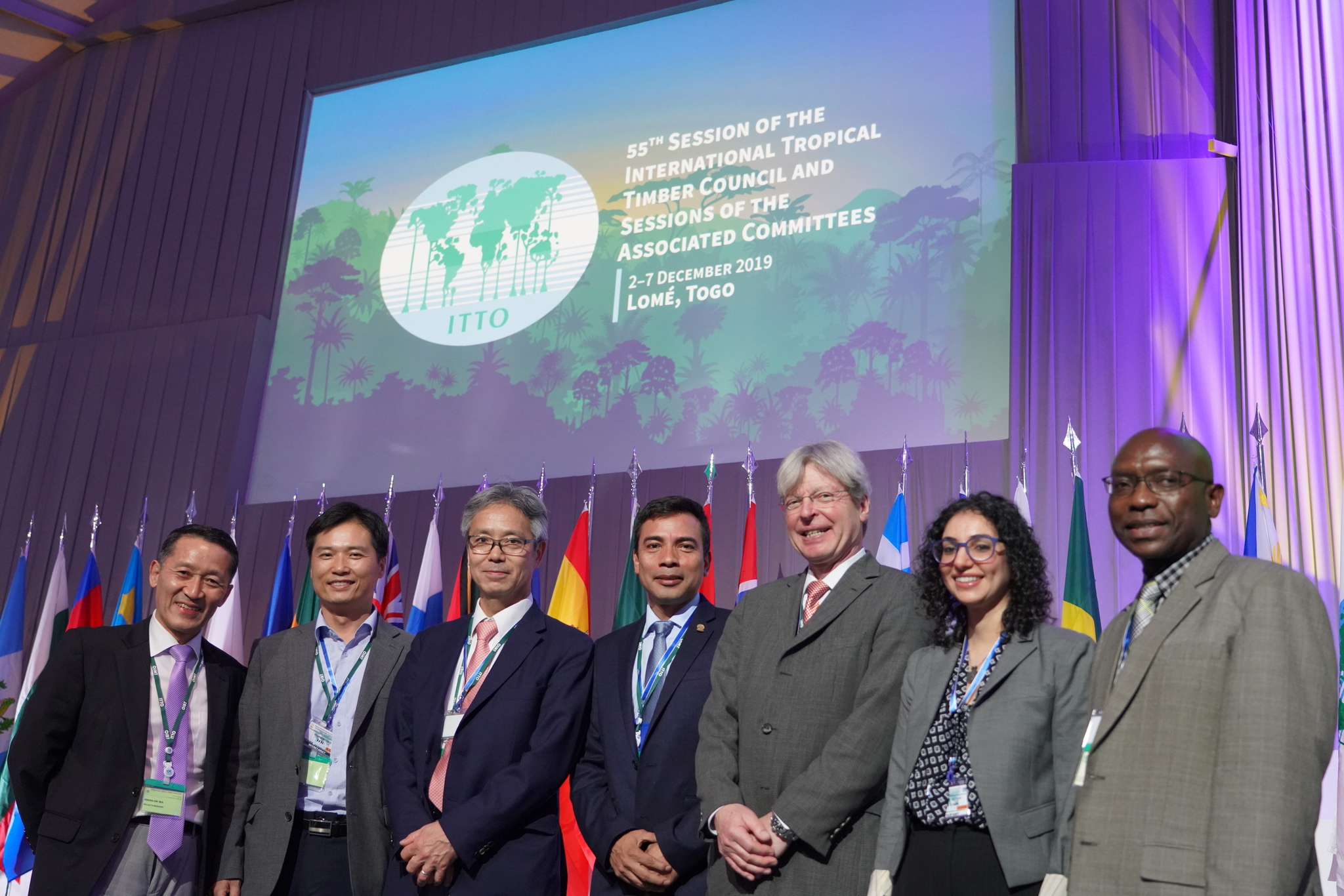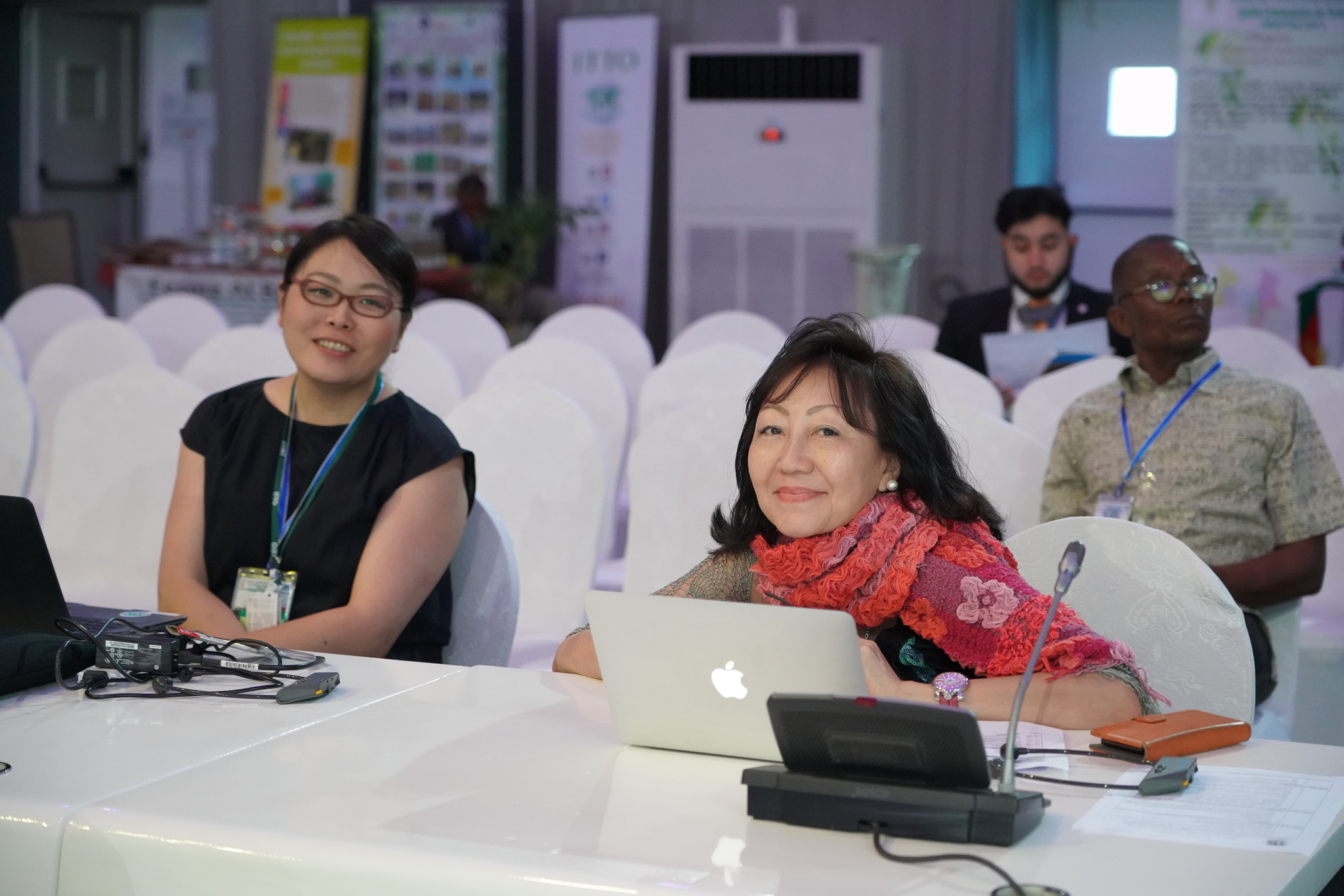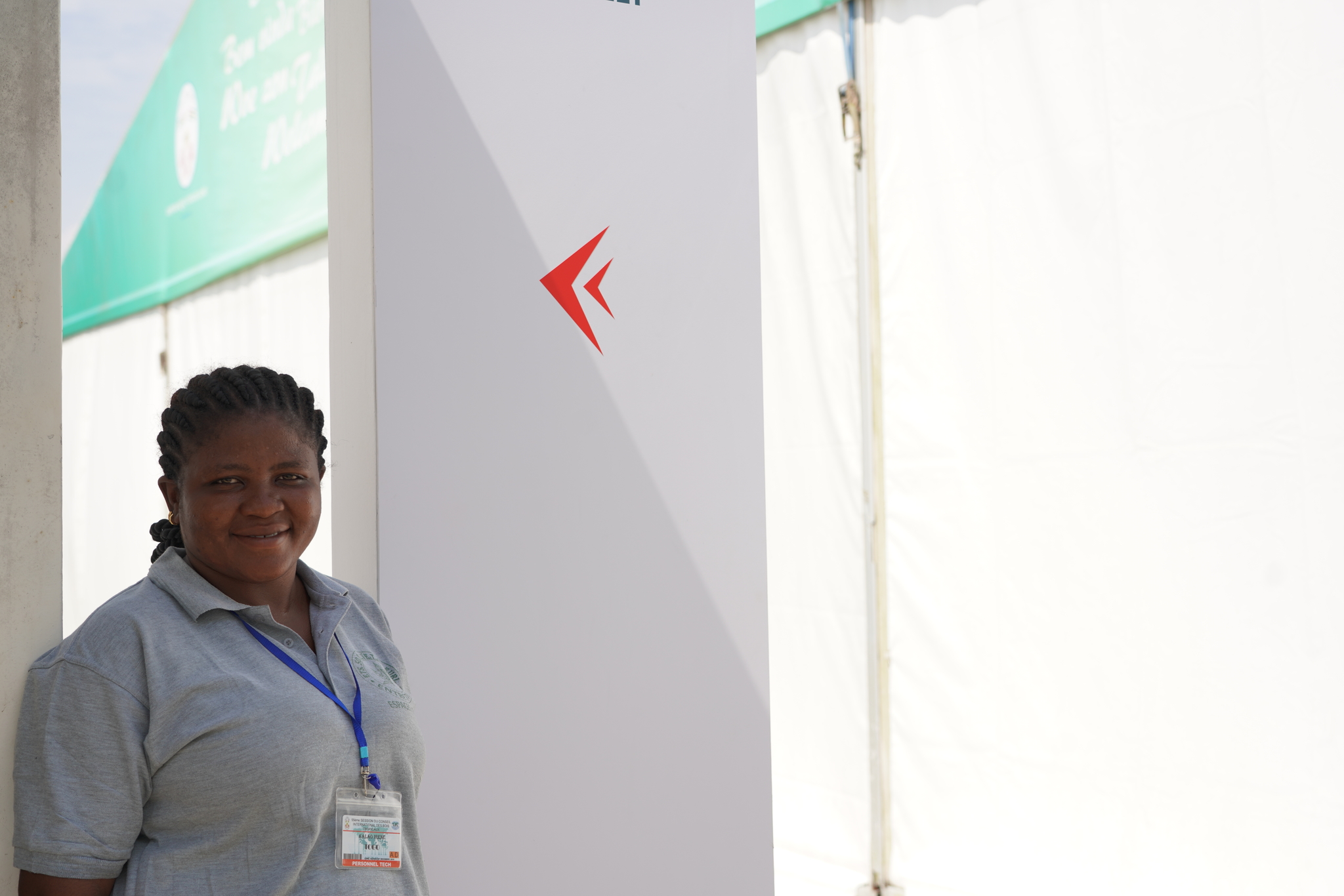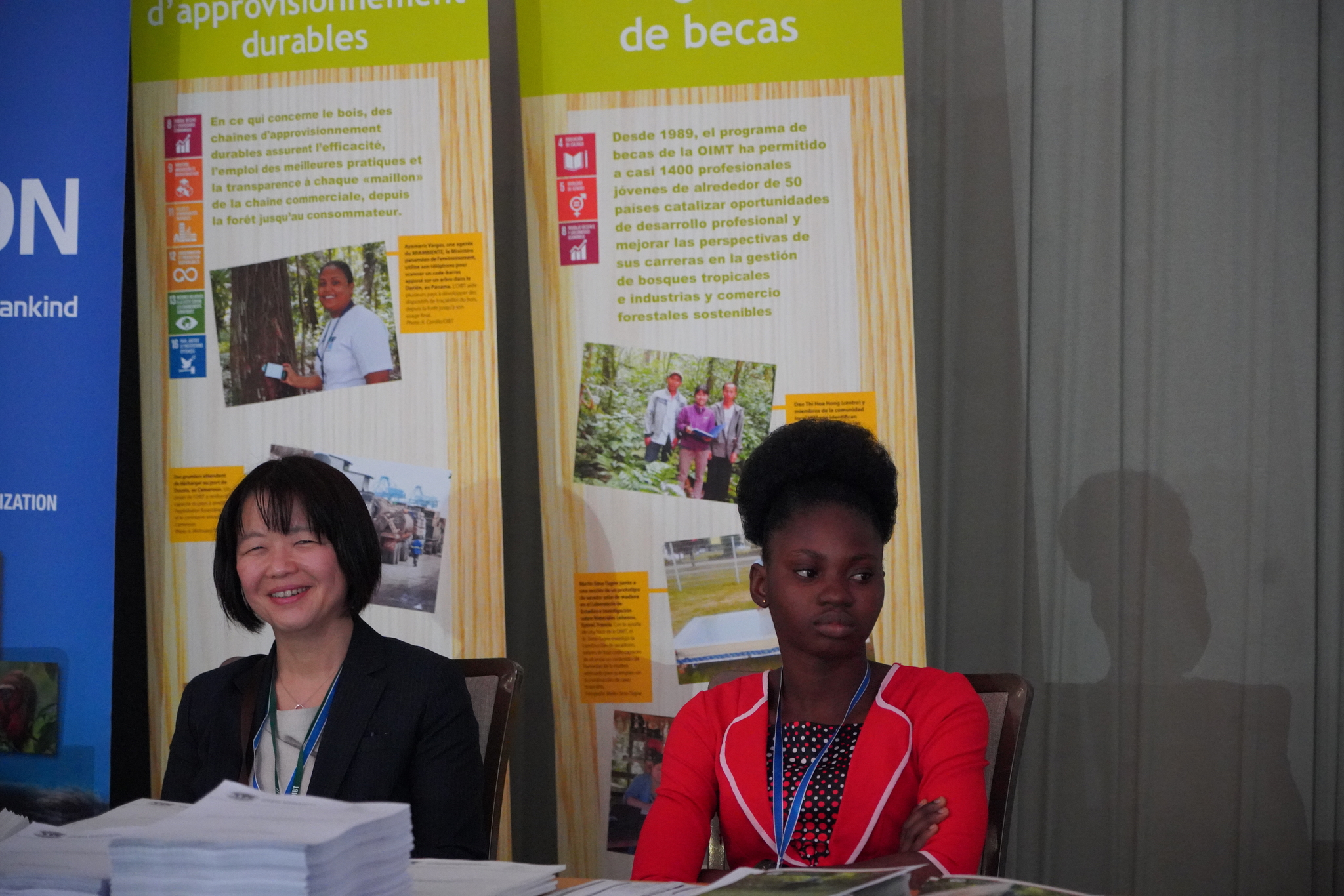Togo women take initiative in forest sector, need help
Highlights for Thursday, 5 December 2019
These Togolese women trained in sustainable forest management at a workshop convened with ITTO support. Photo: REFACOF
Involving women in forestry can reduce pressure on deforestation and improve forest management, but they need assistance to enable their enterprises to grow. This was one of the conclusions to arise from a panel discussion on “women and markets” convened by the Civil Society Advisory Group on day 4 of the 55th Session of the International Tropical Timber Council.
Yawa Edzodzinam Dogbe said that, in Togo, women had taken the initiative to intervene in the sustainable management of forests through actions that reduce pressure on forests.
Ms Dogbe is a member of the African Women’s Network for Community Management of Forests (REFACOF), a non-governmental organization (NGO) promoting collective action by African women to address social, political, legal and economic challenges related to forest management in Africa. REFACOF has chapters in several countries on the continent.
Ms Dogbe said that a group of about 60 women’s NGOs in Togo had joined forces to implement a small project financed by the World Bank to promote the use of improved stoves in rural households. The project had worked in 60 townships to raise awareness of the effects of climate change, the causes and consequences of deforestation and the benefits of using improved cookstoves. Some 2000 improved metal and ceramic stoves had been distributed in 2000 rural households. Three hundred rural women entrepreneurs had received training in the manufacture of improved cookstoves, which they are now selling in local markets.
According to Ms Dogbe, the use of improved stoves in rural households has made it possible to reduce the consumption of wood energy, the time women spend cooking, and household costs incurred by women.
Ms Dogbe expressed the hope that financial support will be forthcoming for a national capacity-building programme for rural women entrepreneurs that would help scale up the manufacture and commercialization of improved stoves to national and regional markets.
Another speaker on the panel, Rachel Awoussi Boyindjo, from the NGO Dimension Humaine in Togo, said women play extremely important roles in forestry in her country.
“They cut the wood and transport it, they produce charcoal, and they help reforest degraded areas,” she said.
According to Ms Boyindjo, women account for 97% of the charcoal market in Togo and 35–40% of the lumber market. They also produce large quantities of palm oil harvested in forests, generating considerable revenues. Such activities enable women to make important contributions to family, community and national economies and reduce pressure on natural ecosystems.
Nevertheless, said Ms Boyindjo, women work mostly in the informal sector and face many problems because of this; moreover, women still lacked adequate access to land and forests for developing their enterprises. She called for more support for reforestation, the allocation of forests and land to women, capacity building for women, and improvements in the legal framework to enable small producers, especially women, to develop their businesses.
During the panel discussion, REFACOF president Cécile Ndjebet announced the launch of the REFACOF chapter in Togo. She reported that REFACOF had convened a two-day workshop—funded by ITTO—in Lomé immediately before the Council session. The aim of the workshop, which was attended by 24 Togolese women involved in various aspects of forest management, was to inform participants of the work of ITTO and thereby enable them to participate actively in the Council session.
In closing the panel, moderator Sheam Satkuru from the ITTO Secretariat said the striking point in the presentations was the ways in which involving women in forestry can help reduce forest degradation and loss. Nevertheless, she said, women entrepreneurs need assistance in legalizing their enterprises and developing their capacity to operate profitable, efficient businesses. Ms Satkuru pointed out that ITTO’s Legal and Sustainable Supply Chains pilot programme could help address these needs.
Click here to access the presentations of the "women and markets" panel.
Involving women in forestry can reduce pressure on deforestation and improve forest management, but they need assistance to enable their enterprises to grow. This was one of the conclusions to arise from a panel discussion on “women and markets” convened by the Civil Society Advisory Group on day 4 of the 55th Session of the International Tropical Timber Council.
Yawa Edzodzinam Dogbe said that, in Togo, women had taken the initiative to intervene in the sustainable management of forests through actions that reduce pressure on forests.
Ms Dogbe is a member of the African Women’s Network for Community Management of Forests (REFACOF), a non-governmental organization (NGO) promoting collective action by African women to address social, political, legal and economic challenges related to forest management in Africa. REFACOF has chapters in several countries on the continent.
Ms Dogbe said that a group of about 60 women’s NGOs in Togo had joined forces to implement a small project financed by the World Bank to promote the use of improved stoves in rural households. The project had worked in 60 townships to raise awareness of the effects of climate change, the causes and consequences of deforestation and the benefits of using improved cookstoves. Some 2000 improved metal and ceramic stoves had been distributed in 2000 rural households. Three hundred rural women entrepreneurs had received training in the manufacture of improved cookstoves, which they are now selling in local markets.
According to Ms Dogbe, the use of improved stoves in rural households has made it possible to reduce the consumption of wood energy, the time women spend cooking, and household costs incurred by women.
Ms Dogbe expressed the hope that financial support will be forthcoming for a national capacity-building programme for rural women entrepreneurs that would help scale up the manufacture and commercialization of improved stoves to national and regional markets.
Another speaker on the panel, Rachel Awoussi Boyindjo, from the NGO Dimension Humaine in Togo, said women play extremely important roles in forestry in her country.
“They cut the wood and transport it, they produce charcoal, and they help reforest degraded areas,” she said.
According to Ms Boyindjo, women account for 97% of the charcoal market in Togo and 35–40% of the lumber market. They also produce large quantities of palm oil harvested in forests, generating considerable revenues. Such activities enable women to make important contributions to family, community and national economies and reduce pressure on natural ecosystems.
Nevertheless, said Ms Boyindjo, women work mostly in the informal sector and face many problems because of this; moreover, women still lacked adequate access to land and forests for developing their enterprises. She called for more support for reforestation, the allocation of forests and land to women, capacity building for women, and improvements in the legal framework to enable small producers, especially women, to develop their businesses.
During the panel discussion, REFACOF president Cécile Ndjebet announced the launch of the REFACOF chapter in Togo. She reported that REFACOF had convened a two-day workshop—funded by ITTO—in Lomé immediately before the Council session. The aim of the workshop, which was attended by 24 Togolese women involved in various aspects of forest management, was to inform participants of the work of ITTO and thereby enable them to participate actively in the Council session.
In closing the panel, moderator Sheam Satkuru from the ITTO Secretariat said the striking point in the presentations was the ways in which involving women in forestry can help reduce forest degradation and loss. Nevertheless, she said, women entrepreneurs need assistance in legalizing their enterprises and developing their capacity to operate profitable, efficient businesses. Ms Satkuru pointed out that ITTO’s Legal and Sustainable Supply Chains pilot programme could help address these needs.
Click here to access the presentations of the "women and markets" panel.
Mr Chen Hin Keong, TRAFFIC, delivers the Civil Society Advisory Group statement on day 4 of the 55th Session of the International Tropical Timber Council. Photo: R. Carrillo/ITTO
Be cautious on plantations, says Civil Society Advisory Group
The Civil Society Advisory Group (CSAG) has urged caution about assuming that tree plantations are always good and beneficial. The CSAG statement, presented by coordinator Chen Hin Keong on day 4 of the 55th Session of the International Tropical Timber Council, expressed deep concern about what appeared to be an undue focus on the procurement of timber from plantation forests.
“Governments need to wake up to the fact that their forests are the greatest natural resource a country possesses,” according to the statement.
The statement acknowledged that tree plantations would inevitably become more important in the forest sector. Nevertheless, ITTO should continue to address the sustainable management of natural forests for the many services and benefits they provide.
“We urge Council to work with members to find markets for sustainably sourced higher-value timber species from natural forests … and work with indigenous peoples and local communities, including women and the youth, to manage forests sustainably and to ensure sustainable use of their many forest products.” ITTO should, “go back to basics—focus on sustainable forest management and species conservation for sustainable utilisation—for the people of this world, and for the health of our planet.”
The CSAG statement commended the ITTO Secretariat for initiating a new programmatic approach to the Organization’s work. Moreover, “throughout the long history of ITTO, the Organization has done great work in developing guidelines to help SFM”. The statement urged the Council to adopt the Guidelines for Forest Landscape Restoration in the Tropics and the ITTO Environmental and Social Management Guidelines. The statement indicated that CSAG will continue to advocate and share the various ITTO guidelines widely, and it recommended regular monitoring and evaluation, in collaboration with CSAG, on progress towards the implementation of the ITTO guidelines.
Read the full CSAG statement here.
Also on day 4 of the Council Session, the Council met in closed session to discuss agenda item 15(a) on the term of appointment of the Executive Director. The joint committee session received the report of the 54th Expert Panel. The Committee on Reforestation and Forest Management, the Panel on Sub-account B of the Bali Partnership Fund, the Chairperson’s consultation with donors on project financing, and the Chairperson’s Open-ended Drafting Group all convened during the day.
Be cautious on plantations, says Civil Society Advisory Group
The Civil Society Advisory Group (CSAG) has urged caution about assuming that tree plantations are always good and beneficial. The CSAG statement, presented by coordinator Chen Hin Keong on day 4 of the 55th Session of the International Tropical Timber Council, expressed deep concern about what appeared to be an undue focus on the procurement of timber from plantation forests.
“Governments need to wake up to the fact that their forests are the greatest natural resource a country possesses,” according to the statement.
The statement acknowledged that tree plantations would inevitably become more important in the forest sector. Nevertheless, ITTO should continue to address the sustainable management of natural forests for the many services and benefits they provide.
“We urge Council to work with members to find markets for sustainably sourced higher-value timber species from natural forests … and work with indigenous peoples and local communities, including women and the youth, to manage forests sustainably and to ensure sustainable use of their many forest products.” ITTO should, “go back to basics—focus on sustainable forest management and species conservation for sustainable utilisation—for the people of this world, and for the health of our planet.”
The CSAG statement commended the ITTO Secretariat for initiating a new programmatic approach to the Organization’s work. Moreover, “throughout the long history of ITTO, the Organization has done great work in developing guidelines to help SFM”. The statement urged the Council to adopt the Guidelines for Forest Landscape Restoration in the Tropics and the ITTO Environmental and Social Management Guidelines. The statement indicated that CSAG will continue to advocate and share the various ITTO guidelines widely, and it recommended regular monitoring and evaluation, in collaboration with CSAG, on progress towards the implementation of the ITTO guidelines.
Read the full CSAG statement here.
Also on day 4 of the Council Session, the Council met in closed session to discuss agenda item 15(a) on the term of appointment of the Executive Director. The joint committee session received the report of the 54th Expert Panel. The Committee on Reforestation and Forest Management, the Panel on Sub-account B of the Bali Partnership Fund, the Chairperson’s consultation with donors on project financing, and the Chairperson’s Open-ended Drafting Group all convened during the day.
The Civil Society Advisory Group convened a panel discussion on women and markets on day 4 of the 55th Session of the International Tropical Timber Council. Photo: R. Carrillo/ITTO
Ms Jennifer Conje (USA) makes an intervention during the panel discussion on women and markets convened on day 4 of the 55th Session of the International Tropical Timber Council. Photo: R. Carrillo/ITTO
A delegate of the Congo makes an intervention during the panel discussion on women and markets convened on day 4 of the 55th Session of the International Tropical Timber Council. Photo: R. Carrillo/ITTO
Members of the panel on women and markets share a light moment with ITTO Executive Director Dr Gerhard Dieterle and panel moderator (and ITTO Director of Operations) Sheam Satkuru. Photo: R. Carrillo/ITTO
Dr Jobst-Michael Schroeder (Germany) presents the report of the 54th Expert Panel for Technical Appraisal of Project Proposals at the joint committee session. Photo: R. Carrillo/ITTO
Officer-bearers of the Committee on Reforestation and Forest Management, and ITTO staff, on day 4 of the 55th Session of the International Tropical Timber Council. Photo: R. Carrillo/ITTO
ITTO staff Ms Naho Tamura (left) and Ms Kanako Ishii on day 4 of the 55th Session of the International Tropical Timber Council. Photo: R. Carrillo/ITTO
A member of the local support team at the venue of the 55th Session of the International Tropical Timber Council. Photo: R. Carrillo/ITTO

